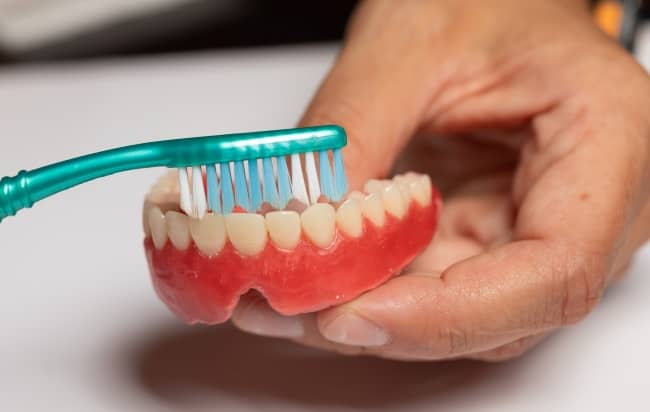How To Repair Loose Dentures
Your dentures should fit comfortably and securely on your gums without the need for adhesive. However, you may find that your dentures become loose with time or no longer fit as well as they did.
Along with being uncomfortable, loose dentures can lead to a variety of difficulties, including health problems. Here, we’ll cover why it is important to see your dentist if your dentures are loose, along with the different options for denture repair.
How Can I Tell If My Dentures Are Loose?
If your dentures are loose, you may notice:
- A clicking noise when you are talking
- Problems with eating
- Mouth sores
- Discomfort
- Slipping or sliding of your dentures when eating, drinking, or talking
If you notice any of these signs, see your dentist immediately for an evaluation. Your dentist will be able to determine the underlying cause of your loose dentures and whether or not they need to be adjusted, relined, or replaced.
Why Are My Dentures Loose?
Dentures become loose for various reasons, with the most common being bone resorption. When the jaw and gums no longer support the natural teeth, the inactivity causes the gums and bones to shrink and change shape.
These changes have a direct impact on the fit, stability, and function of dentures. Without the support of existing gums to keep them in place, dentures can become loose and ill-fitting.
Other reasons dentures become loose include:
- Normal wear and tear over time
- Improper care
- Biting down on hard objects
- Chewing hard foods
What Problems Can Loose Dentures Cause?
Loose dentures are at an increased risk of breakage and can lead to a variety of complications and health issues.
- Chewing Difficulties – Loose-fitting dentures can make it difficult or uncomfortable to chew. This can have a negative impact on your diet if you avoid certain healthy foods due to difficulty chewing.
- Gum Irritation – Loose dentures can rub against gum tissue, causing bleeding, raw spots, irritation, and inflammation. Scrapes or cuts on the gums can lead to infection, while ongoing gum inflammation increases the risk of oral cancer.
- Headaches – Discomfort from loose-fitting dentures can cause earaches and headaches.
- Bite Issues – Loose or ill-fitting dentures can lead to an uneven bite and increase the risk of oral infection.
- Blisters – Loose dentures can rub against your mouth tissue and gums, leading to irritation and blisters.
- TMJ – Loose or poorly fitting dentures can cause uneven pressure and increase the risk of TMJ disorders.
How Can Aged Care Dentistry Help Repair Loose Dentures?
There are several ways Aged Care Dentistry can repair loose-fitting dentures, right from the comfort of your residence. The most important step is to contact us right away if you notice your dentures are loose, damaged, or uncomfortable.
Our dental professionals can travel to you and evaluate the fit of your dentures, check for bone resorption, assess the quality of your dentures, and determine the proper treatment route.
Options for denture repairs for loose dentures include:
- Stronger Denture Adhesive – Until a permanent solution is reached, a stronger denture adhesive may be suggested for temporary use.
- Soft Relining – This quick procedure re-moulds the inner lining of dentures. This option can last for months, or even years, making it an affordable, reliable solution for denture repair.
- Hard Relining – This procedure involves sending newly moulded dentures to a lab to have the denture plastic permanently reshaped. While this procedure takes longer and costs more, it offers a more reliable, durable outcome.
- Dental Implants – In some cases, your dentist may recommend implant-supported dentures also called overdentures. A main advantage of implants is the stimulation they provide to the jawbone, helping to slow bone resorption. While this procedure is pricier than other options and more invasive, it is an effective way to reduce the chance of future adjustments or repairs
How Can I Prevent My Dentures From Becoming Loose?
While some changes to denture fit are inevitable, you can help keep your mouth as healthy as possible by properly caring for your dentures.
Here are some quick tips for maintaining your denture fit as long as possible:
- Eat a healthy, balanced diet to help prevent bone resorption
- Chew solid foods to keep your gums healthy and strong (think of it as an exercise for your mouth)
- Practice proper dental hygiene
- See your dentist for regular checkups
- If notice ill-fitting dentures, contact your dentist immediately (use a strong adhesive to help hold them in place in the meantime)
Can I Repair My Own Dentures?
We always recommend a prompt and professional dental evaluation if you are experiencing any difficulties with your dentures.
Tips for Taking Proper Care of Your Dentures
Taking good care of your dentures helps them maintain a proper fit and can increase their lifespan.
Here are some tips for maintaining your dentures:
- Clean your dentures daily with a soft toothbrush, water, and a denture specific cleaner
- Avoid using toothpaste on your dentures
- Soak your dentures overnight
- Do not attempt to repair your dentures yourself with super-glue
For an in-depth look at caring for your dentures, see our guide to keeping dentures clean and bright.
In Need of Denture Repair for Loose Dentures?
Loose dentures can lead to a variety of difficulties, including discomfort and even health problems. If you are experiencing loose dentures or other dental concerns, please reach out to our caring team of dental professionals immediately.
Loose dentures in elderly patients are a common problem – and one that often goes unaddressed. If you are unable to safely or comfortably travel to a traditional dentist, we come to you! We are prepared with all the latest equipment, allowing us to provide comprehensive mobile dental services, including mobile denture care.
We can travel to your place of residence and evaluate your dentures to ensure they fit properly and function as they should. Contact us today to learn more or set up a consultation.


